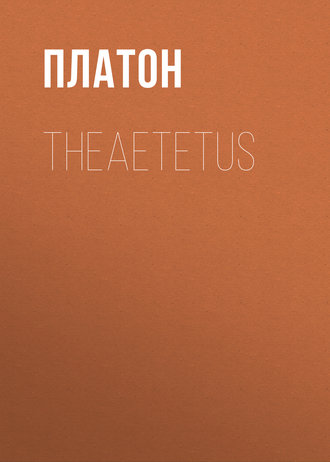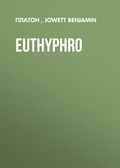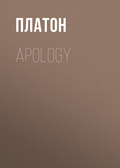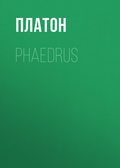
Платон
Theaetetus
Whether space exists in the mind or out of it, is a question which has no meaning. We should rather say that without it the mind is incapable of conceiving the body, and therefore of conceiving itself. The mind may be indeed imagined to contain the body, in the same way that Aristotle (partly following Plato) supposes God to be the outer heaven or circle of the universe. But how can the individual mind carry about the universe of space packed up within, or how can separate minds have either a universe of their own or a common universe? In such conceptions there seems to be a confusion of the individual and the universal. To say that we can only have a true idea of ourselves when we deny the reality of that by which we have any idea of ourselves is an absurdity. The earth which is our habitation and 'the starry heaven above' and we ourselves are equally an illusion, if space is only a quality or condition of our minds.
Again, we may compare the truths of space with other truths derived from experience, which seem to have a necessity to us in proportion to the frequency of their recurrence or the truth of the consequences which may be inferred from them. We are thus led to remark that the necessity in our ideas of space on which much stress has been laid, differs in a slight degree only from the necessity which appears to belong to other of our ideas, e.g. weight, motion, and the like. And there is another way in which this necessity may be explained. We have been taught it, and the truth which we were taught or which we inherited has never been contradicted in all our experience and is therefore confirmed by it. Who can resist an idea which is presented to him in a general form in every moment of his life and of which he finds no instance to the contrary? The greater part of what is sometimes regarded as the a priori intuition of space is really the conception of the various geometrical figures of which the properties have been revealed by mathematical analysis. And the certainty of these properties is immeasurably increased to us by our finding that they hold good not only in every instance, but in all the consequences which are supposed to flow from them.
Neither must we forget that our idea of space, like our other ideas, has a history. The Homeric poems contain no word for it; even the later Greek philosophy has not the Kantian notion of space, but only the definite 'place' or 'the infinite.' To Plato, in the Timaeus, it is known only as the 'nurse of generation.' When therefore we speak of the necessity of our ideas of space we must remember that this is a necessity which has grown up with the growth of the human mind, and has been made by ourselves. We can free ourselves from the perplexities which are involved in it by ascending to a time in which they did not as yet exist. And when space or time are described as 'a priori forms or intuitions added to the matter given in sensation,' we should consider that such expressions belong really to the 'pre-historic study' of philosophy, i.e. to the eighteenth century, when men sought to explain the human mind without regard to history or language or the social nature of man.
In every act of sense there is a latent perception of space, of which we only become conscious when objects are withdrawn from it. There are various ways in which we may trace the connexion between them. We may think of space as unresisting matter, and of matter as divided into objects; or of objects again as formed by abstraction into a collective notion of matter, and of matter as rarefied into space. And motion may be conceived as the union of there and not there in space, and force as the materializing or solidification of motion. Space again is the individual and universal in one; or, in other words, a perception and also a conception. So easily do what are sometimes called our simple ideas pass into one another, and differences of kind resolve themselves into differences of degree.
Within or behind space there is another abstraction in many respects similar to it – time, the form of the inward, as space is the form of the outward. As we cannot think of outward objects of sense or of outward sensations without space, so neither can we think of a succession of sensations without time. It is the vacancy of thoughts or sensations, as space is the void of outward objects, and we can no more imagine the mind without the one than the world without the other. It is to arithmetic what space is to geometry; or, more strictly, arithmetic may be said to be equally applicable to both. It is defined in our minds, partly by the analogy of space and partly by the recollection of events which have happened to us, or the consciousness of feelings which we are experiencing. Like space, it is without limit, for whatever beginning or end of time we fix, there is a beginning and end before them, and so on without end. We speak of a past, present, and future, and again the analogy of space assists us in conceiving of them as coexistent. When the limit of time is removed there arises in our minds the idea of eternity, which at first, like time itself, is only negative, but gradually, when connected with the world and the divine nature, like the other negative infinity of space, becomes positive. Whether time is prior to the mind and to experience, or coeval with them, is (like the parallel question about space) unmeaning. Like space it has been realized gradually: in the Homeric poems, or even in the Hesiodic cosmogony, there is no more notion of time than of space. The conception of being is more general than either, and might therefore with greater plausibility be affirmed to be a condition or quality of the mind. The a priori intuitions of Kant would have been as unintelligible to Plato as his a priori synthetical propositions to Aristotle. The philosopher of Konigsberg supposed himself to be analyzing a necessary mode of thought: he was not aware that he was dealing with a mere abstraction. But now that we are able to trace the gradual developement of ideas through religion, through language, through abstractions, why should we interpose the fiction of time between ourselves and realities? Why should we single out one of these abstractions to be the a priori condition of all the others? It comes last and not first in the order of our thoughts, and is not the condition precedent of them, but the last generalization of them. Nor can any principle be imagined more suicidal to philosophy than to assume that all the truth which we are capable of attaining is seen only through an unreal medium. If all that exists in time is illusion, we may well ask with Plato, 'What becomes of the mind?'
Leaving the a priori conditions of sensation we may proceed to consider acts of sense. These admit of various degrees of duration or intensity; they admit also of a greater or less extension from one object, which is perceived directly, to many which are perceived indirectly or in a less degree, and to the various associations of the object which are latent in the mind. In general the greater the intension the less the extension of them. The simplest sensation implies some relation of objects to one another, some position in space, some relation to a previous or subsequent sensation. The acts of seeing and hearing may be almost unconscious and may pass away unnoted; they may also leave an impression behind them or power of recalling them. If, after seeing an object we shut our eyes, the object remains dimly seen in the same or about the same place, but with form and lineaments half filled up. This is the simplest act of memory. And as we cannot see one thing without at the same time seeing another, different objects hang together in recollection, and when we call for one the other quickly follows. To think of the place in which we have last seen a thing is often the best way of recalling it to the mind. Hence memory is dependent on association. The act of recollection may be compared to the sight of an object at a great distance which we have previously seen near and seek to bring near to us in thought. Memory is to sense as dreaming is to waking; and like dreaming has a wayward and uncertain power of recalling impressions from the past.
Thus begins the passage from the outward to the inward sense. But as yet there is no conception of a universal – the mind only remembers the individual object or objects, and is always attaching to them some colour or association of sense. The power of recollection seems to depend on the intensity or largeness of the perception, or on the strength of some emotion with which it is inseparably connected. This is the natural memory which is allied to sense, such as children appear to have and barbarians and animals. It is necessarily limited in range, and its limitation is its strength. In later life, when the mind has become crowded with names, acts, feelings, images innumerable, we acquire by education another memory of system and arrangement which is both stronger and weaker than the first – weaker in the recollection of sensible impressions as they are represented to us by eye or ear – stronger by the natural connexion of ideas with objects or with one another. And many of the notions which form a part of the train of our thoughts are hardly realized by us at the time, but, like numbers or algebraical symbols, are used as signs only, thus lightening the labour of recollection.
And now we may suppose that numerous images present themselves to the mind, which begins to act upon them and to arrange them in various ways. Besides the impression of external objects present with us or just absent from us, we have a dimmer conception of other objects which have disappeared from our immediate recollection and yet continue to exist in us. The mind is full of fancies which are passing to and fro before it. Some feeling or association calls them up, and they are uttered by the lips. This is the first rudimentary imagination, which may be truly described in the language of Hobbes, as 'decaying sense,' an expression which may be applied with equal truth to memory as well. For memory and imagination, though we sometimes oppose them, are nearly allied; the difference between them seems chiefly to lie in the activity of the one compared with the passivity of the other. The sense decaying in memory receives a flash of light or life from imagination. Dreaming is a link of connexion between them; for in dreaming we feebly recollect and also feebly imagine at one and the same time. When reason is asleep the lower part of the mind wanders at will amid the images which have been received from without, the intelligent element retires, and the sensual or sensuous takes its place. And so in the first efforts of imagination reason is latent or set aside; and images, in part disorderly, but also having a unity (however imperfect) of their own, pour like a flood over the mind. And if we could penetrate into the heads of animals we should probably find that their intelligence, or the state of what in them is analogous to our intelligence, is of this nature.
Thus far we have been speaking of men, rather in the points in which they resemble animals than in the points in which they differ from them. The animal too has memory in various degrees, and the elements of imagination, if, as appears to be the case, he dreams. How far their powers or instincts are educated by the circumstances of their lives or by intercourse with one another or with mankind, we cannot precisely tell. They, like ourselves, have the physical inheritance of form, scent, hearing, sight, and other qualities or instincts. But they have not the mental inheritance of thoughts and ideas handed down by tradition, 'the slow additions that build up the mind' of the human race. And language, which is the great educator of mankind, is wanting in them; whereas in us language is ever present – even in the infant the latent power of naming is almost immediately observable. And therefore the description which has been already given of the nascent power of the faculties is in reality an anticipation. For simultaneous with their growth in man a growth of language must be supposed. The child of two years old sees the fire once and again, and the feeble observation of the same recurring object is associated with the feeble utterance of the name by which he is taught to call it. Soon he learns to utter the name when the object is no longer there, but the desire or imagination of it is present to him. At first in every use of the word there is a colour of sense, an indistinct picture of the object which accompanies it. But in later years he sees in the name only the universal or class word, and the more abstract the notion becomes, the more vacant is the image which is presented to him. Henceforward all the operations of his mind, including the perceptions of sense, are a synthesis of sensations, words, conceptions. In seeing or hearing or looking or listening the sensible impression prevails over the conception and the word. In reflection the process is reversed – the outward object fades away into nothingness, the name or the conception or both together are everything. Language, like number, is intermediate between the two, partaking of the definiteness of the outer and of the universality of the inner world. For logic teaches us that every word is really a universal, and only condescends by the help of position or circumlocution to become the expression of individuals or particulars. And sometimes by using words as symbols we are able to give a 'local habitation and a name' to the infinite and inconceivable.
Thus we see that no line can be drawn between the powers of sense and of reflection – they pass imperceptibly into one another. We may indeed distinguish between the seeing and the closed eye – between the sensation and the recollection of it. But this distinction carries us a very little way, for recollection is present in sight as well as sight in recollection. There is no impression of sense which does not simultaneously recall differences of form, number, colour, and the like. Neither is such a distinction applicable at all to our internal bodily sensations, which give no sign of themselves when unaccompanied with pain, and even when we are most conscious of them, have often no assignable place in the human frame. Who can divide the nerves or great nervous centres from the mind which uses them? Who can separate the pains and pleasures of the mind from the pains and pleasures of the body? The words 'inward and outward,' 'active and passive,' 'mind and body,' are best conceived by us as differences of degree passing into differences of kind, and at one time and under one aspect acting in harmony and then again opposed. They introduce a system and order into the knowledge of our being; and yet, like many other general terms, are often in advance of our actual analysis or observation.
According to some writers the inward sense is only the fading away or imperfect realization of the outward. But this leaves out of sight one half of the phenomenon. For the mind is not only withdrawn from the world of sense but introduced to a higher world of thought and reflection, in which, like the outward sense, she is trained and educated. By use the outward sense becomes keener and more intense, especially when confined within narrow limits. The savage with little or no thought has a quicker discernment of the track than the civilised man; in like manner the dog, having the help of scent as well as of sight, is superior to the savage. By use again the inward thought becomes more defined and distinct; what was at first an effort is made easy by the natural instrumentality of language, and the mind learns to grasp universals with no more exertion than is required for the sight of an outward object. There is a natural connexion and arrangement of them, like the association of objects in a landscape. Just as a note or two of music suffices to recall a whole piece to the musician's or composer's mind, so a great principle or leading thought suggests and arranges a world of particulars. The power of reflection is not feebler than the faculty of sense, but of a higher and more comprehensive nature. It not only receives the universals of sense, but gives them a new content by comparing and combining them with one another. It withdraws from the seen that it may dwell in the unseen. The sense only presents us with a flat and impenetrable surface: the mind takes the world to pieces and puts it together on a new pattern. The universals which are detached from sense are reconstructed in science. They and not the mere impressions of sense are the truth of the world in which we live; and (as an argument to those who will only believe 'what they can hold in their hands') we may further observe that they are the source of our power over it. To say that the outward sense is stronger than the inward is like saying that the arm of the workman is stronger than the constructing or directing mind.
Returning to the senses we may briefly consider two questions – first their relation to the mind, secondly, their relation to outward objects: —
1. The senses are not merely 'holes set in a wooden horse' (Theaet.), but instruments of the mind with which they are organically connected. There is no use of them without some use of words – some natural or latent logic – some previous experience or observation. Sensation, like all other mental processes, is complex and relative, though apparently simple. The senses mutually confirm and support one another; it is hard to say how much our impressions of hearing may be affected by those of sight, or how far our impressions of sight may be corrected by the touch, especially in infancy. The confirmation of them by one another cannot of course be given by any one of them. Many intuitions which are inseparable from the act of sense are really the result of complicated reasonings. The most cursory glance at objects enables the experienced eye to judge approximately of their relations and distance, although nothing is impressed upon the retina except colour, including gradations of light and shade. From these delicate and almost imperceptible differences we seem chiefly to derive our ideas of distance and position. By comparison of what is near with what is distant we learn that the tree, house, river, etc. which are a long way off are objects of a like nature with those which are seen by us in our immediate neighbourhood, although the actual impression made on the eye is very different in one case and in the other. This is a language of 'large and small letters' (Republic), slightly differing in form and exquisitely graduated by distance, which we are learning all our life long, and which we attain in various degrees according to our powers of sight or observation. There is nor the consideration. The greater or less strain upon the nerves of the eye or ear is communicated to the mind and silently informs the judgment. We have also the use not of one eye only, but of two, which give us a wider range, and help us to discern, by the greater or less acuteness of the angle which the rays of sight form, the distance of an object and its relation to other objects. But we are already passing beyond the limits of our actual knowledge on a subject which has given rise to many conjectures. More important than the addition of another conjecture is the observation, whether in the case of sight or of any other sense, of the great complexity of the causes and the great simplicity of the effect.
The sympathy of the mind and the ear is no less striking than the sympathy of the mind and the eye. Do we not seem to perceive instinctively and as an act of sense the differences of articulate speech and of musical notes? Yet how small a part of speech or of music is produced by the impression of the ear compared with that which is furnished by the mind!
Again: the more refined faculty of sense, as in animals so also in man, seems often to be transmitted by inheritance. Neither must we forget that in the use of the senses, as in his whole nature, man is a social being, who is always being educated by language, habit, and the teaching of other men as well as by his own observation. He knows distance because he is taught it by a more experienced judgment than his own; he distinguishes sounds because he is told to remark them by a person of a more discerning ear. And as we inherit from our parents or other ancestors peculiar powers of sense or feeling, so we improve and strengthen them, not only by regular teaching, but also by sympathy and communion with other persons.
2. The second question, namely, that concerning the relation of the mind to external objects, is really a trifling one, though it has been made the subject of a famous philosophy. We may if we like, with Berkeley, resolve objects of sense into sensations; but the change is one of name only, and nothing is gained and something is lost by such a resolution or confusion of them. For we have not really made a single step towards idealism, and any arbitrary inversion of our ordinary modes of speech is disturbing to the mind. The youthful metaphysician is delighted at his marvellous discovery that nothing is, and that what we see or feel is our sensation only: for a day or two the world has a new interest to him; he alone knows the secret which has been communicated to him by the philosopher, that mind is all – when in fact he is going out of his mind in the first intoxication of a great thought. But he soon finds that all things remain as they were – the laws of motion, the properties of matter, the qualities of substances. After having inflicted his theories on any one who is willing to receive them 'first on his father and mother, secondly on some other patient listener, thirdly on his dog,' he finds that he only differs from the rest of mankind in the use of a word. He had once hoped that by getting rid of the solidity of matter he might open a passage to worlds beyond. He liked to think of the world as the representation of the divine nature, and delighted to imagine angels and spirits wandering through space, present in the room in which he is sitting without coming through the door, nowhere and everywhere at the same instant. At length he finds that he has been the victim of his own fancies; he has neither more nor less evidence of the supernatural than he had before. He himself has become unsettled, but the laws of the world remain fixed as at the beginning. He has discovered that his appeal to the fallibility of sense was really an illusion. For whatever uncertainty there may be in the appearances of nature, arises only out of the imperfection or variation of the human senses, or possibly from the deficiency of certain branches of knowledge; when science is able to apply her tests, the uncertainty is at an end. We are apt sometimes to think that moral and metaphysical philosophy are lowered by the influence which is exercised over them by physical science. But any interpretation of nature by physical science is far in advance of such idealism. The philosophy of Berkeley, while giving unbounded license to the imagination, is still grovelling on the level of sense.
We may, if we please, carry this scepticism a step further, and deny, not only objects of sense, but the continuity of our sensations themselves. We may say with Protagoras and Hume that what is appears, and that what appears appears only to individuals, and to the same individual only at one instant. But then, as Plato asks, – and we must repeat the question, – What becomes of the mind? Experience tells us by a thousand proofs that our sensations of colour, taste, and the like, are the same as they were an instant ago – that the act which we are performing one minute is continued by us in the next – and also supplies abundant proof that the perceptions of other men are, speaking generally, the same or nearly the same with our own. After having slowly and laboriously in the course of ages gained a conception of a whole and parts, of the constitution of the mind, of the relation of man to God and nature, imperfect indeed, but the best we can, we are asked to return again to the 'beggarly elements' of ancient scepticism, and acknowledge only atoms and sensations devoid of life or unity. Why should we not go a step further still and doubt the existence of the senses of all things? We are but 'such stuff as dreams are made of;' for we have left ourselves no instruments of thought by which we can distinguish man from the animals, or conceive of the existence even of a mollusc. And observe, this extreme scepticism has been allowed to spring up among us, not, like the ancient scepticism, in an age when nature and language really seemed to be full of illusions, but in the eighteenth and nineteenth centuries, when men walk in the daylight of inductive science.
The attractiveness of such speculations arises out of their true nature not being perceived. They are veiled in graceful language; they are not pushed to extremes; they stop where the human mind is disposed also to stop – short of a manifest absurdity. Their inconsistency is not observed by their authors or by mankind in general, who are equally inconsistent themselves. They leave on the mind a pleasing sense of wonder and novelty: in youth they seem to have a natural affinity to one class of persons as poetry has to another; but in later life either we drift back into common sense, or we make them the starting-points of a higher philosophy.
We are often told that we should enquire into all things before we accept them; – with what limitations is this true? For we cannot use our senses without admitting that we have them, or think without presupposing that there is in us a power of thought, or affirm that all knowledge is derived from experience without implying that this first principle of knowledge is prior to experience. The truth seems to be that we begin with the natural use of the mind as of the body, and we seek to describe this as well as we can. We eat before we know the nature of digestion; we think before we know the nature of reflection. As our knowledge increases, our perception of the mind enlarges also. We cannot indeed get beyond facts, but neither can we draw any line which separates facts from ideas. And the mind is not something separate from them but included in them, and they in the mind, both having a distinctness and individuality of their own. To reduce our conception of mind to a succession of feelings and sensations is like the attempt to view a wide prospect by inches through a microscope, or to calculate a period of chronology by minutes. The mind ceases to exist when it loses its continuity, which though far from being its highest determination, is yet necessary to any conception of it. Even an inanimate nature cannot be adequately represented as an endless succession of states or conditions.
Paragraph II. Another division of the subject has yet to be considered: Why should the doctrine that knowledge is sensation, in ancient times, or of sensationalism or materialism in modern times, be allied to the lower rather than to the higher view of ethical philosophy? At first sight the nature and origin of knowledge appear to be wholly disconnected from ethics and religion, nor can we deny that the ancient Stoics were materialists, or that the materialist doctrines prevalent in modern times have been associated with great virtues, or that both religious and philosophical idealism have not unfrequently parted company with practice. Still upon the whole it must be admitted that the higher standard of duty has gone hand in hand with the higher conception of knowledge. It is Protagoras who is seeking to adapt himself to the opinions of the world; it is Plato who rises above them: the one maintaining that all knowledge is sensation; the other basing the virtues on the idea of good. The reason of this phenomenon has now to be examined.
By those who rest knowledge immediately upon sense, that explanation of human action is deemed to be the truest which is nearest to sense. As knowledge is reduced to sensation, so virtue is reduced to feeling, happiness or good to pleasure. The different virtues – the various characters which exist in the world – are the disguises of self-interest. Human nature is dried up; there is no place left for imagination, or in any higher sense for religion. Ideals of a whole, or of a state, or of a law of duty, or of a divine perfection, are out of place in an Epicurean philosophy. The very terms in which they are expressed are suspected of having no meaning. Man is to bring himself back as far as he is able to the condition of a rational beast. He is to limit himself to the pursuit of pleasure, but of this he is to make a far-sighted calculation; – he is to be rationalized, secularized, animalized: or he is to be an amiable sceptic, better than his own philosophy, and not falling below the opinions of the world.
Imagination has been called that 'busy faculty' which is always intruding upon us in the search after truth. But imagination is also that higher power by which we rise above ourselves and the commonplaces of thought and life. The philosophical imagination is another name for reason finding an expression of herself in the outward world. To deprive life of ideals is to deprive it of all higher and comprehensive aims and of the power of imparting and communicating them to others. For men are taught, not by those who are on a level with them, but by those who rise above them, who see the distant hills, who soar into the empyrean. Like a bird in a cage, the mind confined to sense is always being brought back from the higher to the lower, from the wider to the narrower view of human knowledge. It seeks to fly but cannot: instead of aspiring towards perfection, 'it hovers about this lower world and the earthly nature.' It loses the religious sense which more than any other seems to take a man out of himself. Weary of asking 'What is truth?' it accepts the 'blind witness of eyes and ears;' it draws around itself the curtain of the physical world and is satisfied. The strength of a sensational philosophy lies in the ready accommodation of it to the minds of men; many who have been metaphysicians in their youth, as they advance in years are prone to acquiesce in things as they are, or rather appear to be. They are spectators, not thinkers, and the best philosophy is that which requires of them the least amount of mental effort.







